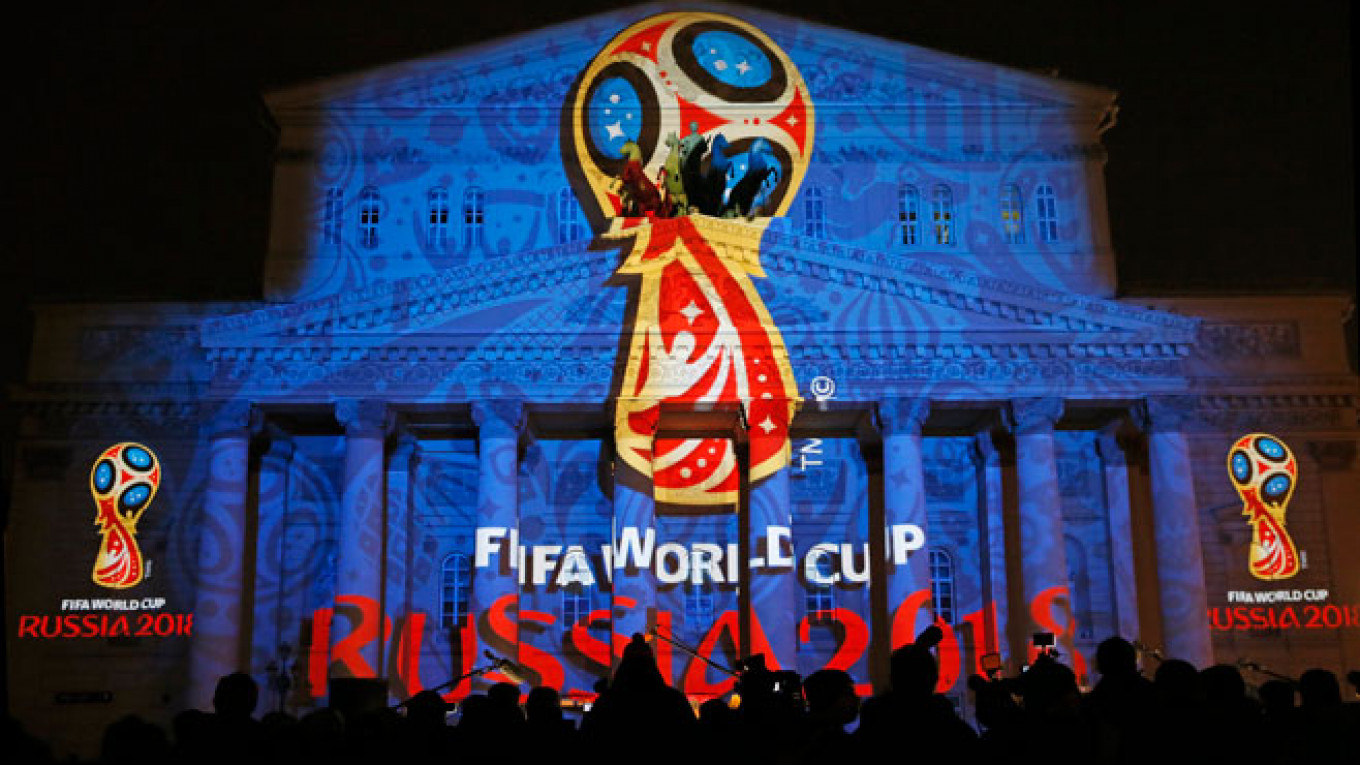The Local Organizing Committee (LOC) for Russia's 2018 World Cup said Thursday that Western sanctions and the drastic depreciation of the ruble in recent months would not influence the country's preparations, as FIFA officially dismissed reports that the bid to host the tournament had been marred by corruption.
"No World Cup budget adjustments are being considered at this time," said LOC head Alexei Sorokin at the first in a series of football industry conferences ahead of the 2018 tournament. "This question should be asked to the Russian government, of course. But as a sports manager, I can tell you that this is not being discussed right now."
Earlier Thursday, FIFA's ethics committee said it could find no grounds for reopening the bidding process for the 2018 and 2022 tournaments, to be held in Russia and Qatar, respectively.
Officials and businesspeople involved in Russia's preparations to host the World Cup hailed the progress made in preparations. ?
Two of the 12 stadiums due to host the tournament — Moscow's newly built Otkrytie Arena and the 45,105-seat Kazan Arena — are deemed almost ready to host World Cup matches. The remaining ten are either slated for reconstruction or are still under construction, including eight that are still at the design stage.
Just over a quarter of the estimated $18 billion budget is earmarked for the completion of sporting venues, while an estimated $9.1 billion — more than half the budget — will be spent on developing transportation infrastructure.
The unfinished stadiums should be ready by May 2017, according to Alexei Milovanov, CEO of Arena 2018, an expert body created by the LOC to oversee and monitor the venues' construction.
The stadiums that are considered almost ready to host World Cup matches will have to undergo adaptation work to comply with FIFA requirements. For the Otkrytie Arena and the Kazan Arena, these works should be completed by May 2016, according to Milovanov.
"We received the final version of FIFA's requirements quite late, in November of this year," Milovanov said Thursday. "The requirements have become stricter since the 2014 World Cup. There use to be a lot of recommendations; now there are many more requirements." ?
A joint delegation composed of FIFA and LOC representatives visited several of Russia's finished and unfinished World Cup stadiums last month and expressed satisfaction with the progress.
"I can say that in comparison with Brazil, Russia is considerably ahead of schedule with four years remaining before the event's start," FIFA head Sepp Blatter was cited as saying by Agence France-Presse after the inspections.
Ricardo Trade, head of the LOC for Brazil's 2014 World Cup, said that FIFA had requested that the 12 Brazilian stadiums that hosted matches this summer be ready six months before the start of the tournament.
"The stadium where the opening match took place [the Sao Paulo Arena] was ready 15 days before the World Cup," Trade admitted. "It was not ideal. My advice to Russia: Make sure you have enough time to test your stadiums in advance."
Despite his Brazilian counterpart's warning, Sorokin insisted that the country was on track and would not squander the resources it is investing in hosting one of the world's largest sporting events.
"Everything being built is geared toward having a long-term positive effect and will be actively used in the future," he said. "We are not building anything that will not serve this purpose."
Contact the author at g.tetraultfarber@imedia.ru
A Message from The Moscow Times:
Dear readers,
We are facing unprecedented challenges. Russia's Prosecutor General's Office has designated The Moscow Times as an "undesirable" organization, criminalizing our work and putting our staff at risk of prosecution. This follows our earlier unjust labeling as a "foreign agent."
These actions are direct attempts to silence independent journalism in Russia. The authorities claim our work "discredits the decisions of the Russian leadership." We see things differently: we strive to provide accurate, unbiased reporting on Russia.
We, the journalists of The Moscow Times, refuse to be silenced. But to continue our work, we need your help.
Your support, no matter how small, makes a world of difference. If you can, please support us monthly starting from just $2. It's quick to set up, and every contribution makes a significant impact.
By supporting The Moscow Times, you're defending open, independent journalism in the face of repression. Thank you for standing with us.
Remind me later.


